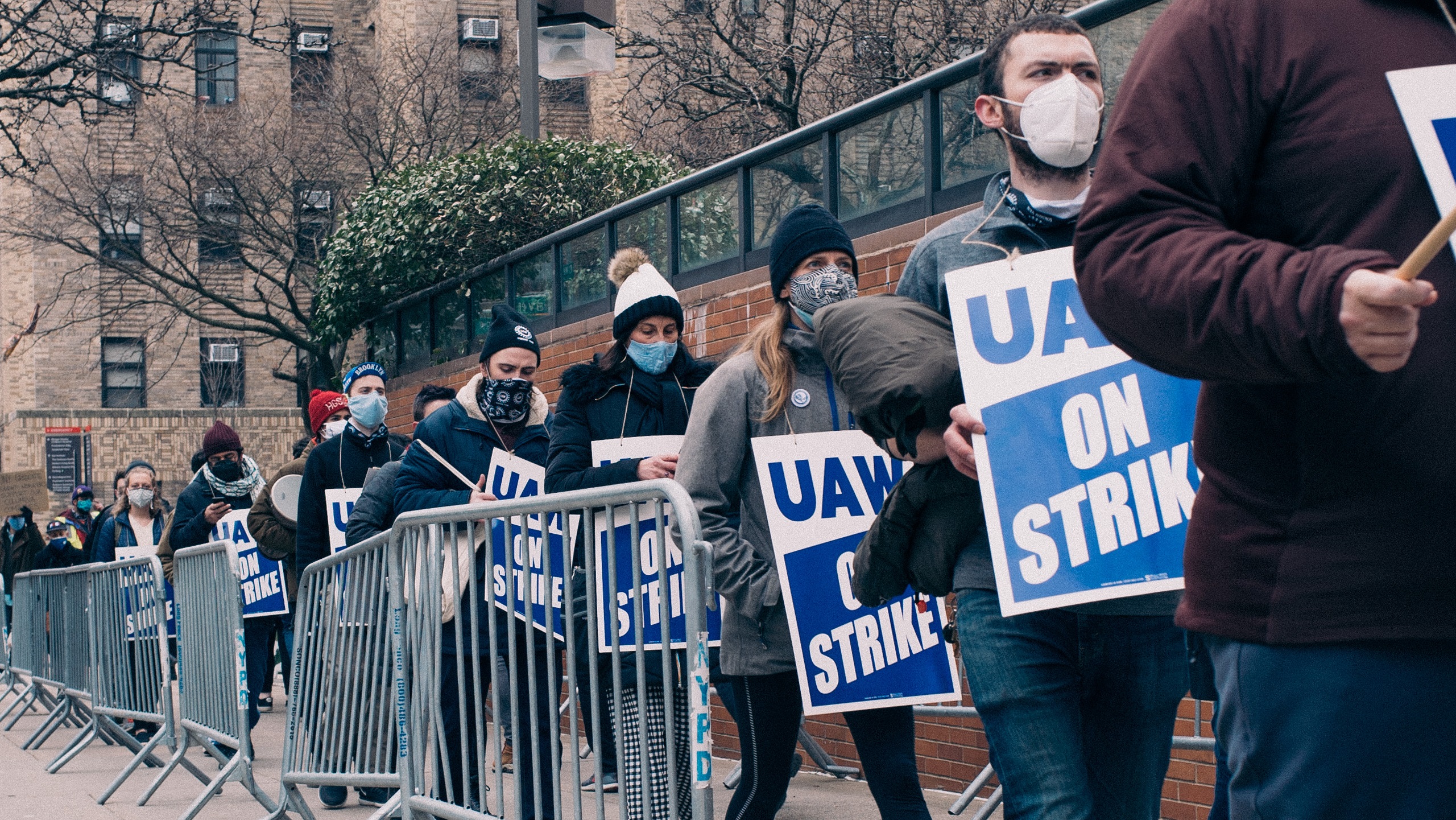Research students at New York University (NYU) have announced a strike vote after nine months of failed negotiation attempts with the university administration. The announcement, made on Friday, March 19, is the latest in growing mobilizations against unfair work contracts for student workers. The vote is called by the Graduate Student Organizing Committee – United Auto Workers (GSOC-UAW) and will be held on March 23.
Earlier this week, student workers at Illinois State University (ISU) also announced a vote for strike action after a prolonged negotiation with the university administration failed to yield results. The strike vote in ISU is scheduled for April 2, when hundreds of research students will decide to authorize a strike action.
Similarly, on March 15, 3,000 graduate students at Columbia University in New York City began an indefinite strike which influenced the developments at both ISU and NYU.
“In announcing a strike authorization vote, we are so inspired to share a movement with our uptown comrades at (Graduate Workers of Columbia), currently on strike at Columbia for a living wage and #RealRecourse for harassment and discrimination! We are ready to #SpreadtheStrike!” read the GSOC-UAW tweet announcing the strike vote. The tweet was retweeted by the ISU union as well.
More mobilizations and union movements are expected by April, as graduate students who also work as teaching and research assistants are pushing for better work contracts from their respective universities.
“When grad students in multiple universities across the country go on strike, there is, without a doubt, a message that needs to be heard, a system that needs to be changed,” tweeted Elsy Elk, a student at NYU and a member of GSOC-UAW.
Apart from the demands being raised by the student workers, another thing common about these mobilizations is that they are anchored by local chapters of major trade unions. The mobilizations in both NYU and Columbia are led by graduate workers’ groups of the United Auto Workers, with the strike in Columbia being led by Graduate Workers of Columbia (GWC).
ISU’s student workers are organized by Service Employees International Union (SEIU)’s student workers’ branch Graduate Workers Union (GWU). In all these cases the story is very much the same, as students are up against indifferent university administrations that stalled negotiations for months together.
Ever since the GWU gained bargaining rights in October 2019, they have been in a series of negotiations with the ISU administration for living wage and other benefits that has been denied to them for years.
Student workers at ISU, who are largely research and postdoc students who also work as teaching and research assistants at the university, are paid as low as USD 9,441 in a nine-month long academic year. This translates to marginally more than Illinois state’s minimum wage requirement of USD 11 per hour, and much lower than what is offered in most universities in the State.
“The Graduate Workers Union is taking a stand for the dignity of their work as human beings who produce major value for ISU and deserve to live without poverty and without debt,” read the statement released by the GWU announcing the strike vote.
Similarly in NYU, after months of negotiations, the administration had previously agreed for a tiered raise in wages for masters and doctoral students at a rate of USD 1 and USD 2 per hour. But according to union negotiators, the administration rescinded its earlier proposal and only agreed to offer a general raise of USD 1 per hour for all student workers.
Speaking to the Columbia Spectator, Arundhati Velamur, a GSOC-UAW bargaining committee member, said that “after yet another disappointing meeting with NYU, we’re coming together to take action… Our workers refuse the lack of response by NYU and are ready to strike if necessary.”
In Columbia, the stalling and impasse between the administration and the students have been ongoing for more than a year. The GWC held a strike vote in March 2020, and only went ahead with the strike after nearly a whole year of negotiations.
Another major demand from the movement in Columbia includes protections for sexual assault survivors, with the creation of a neutral arbitration mechanism instead of the employer-managed mechanism currently in place.
Apart from the wage hike, students in all three universities have been demanding expansion of healthcare coverage and also protections to international students who are charged several times over an average US citizen with little benefits. Other demands specific to each university include elimination of thousands of dollars in fee deductions from wages in ISU, and removal of police personnel from the campus in NYU.
Apart from these universities, student movements in University of Maryland, Indiana University, University of New Mexico and the University of Chicago, among others are organizing for wage hikes, safe working environments in the middle of the COVID-19 pandemic and other benefits offered to average workers, as per existing labor regulations.





